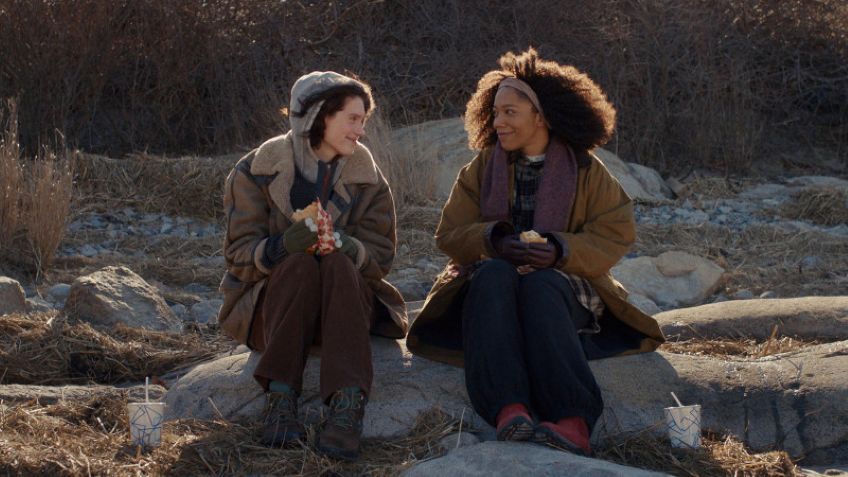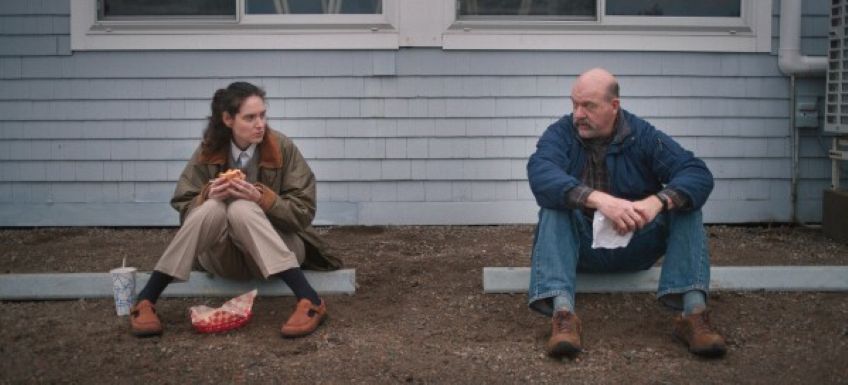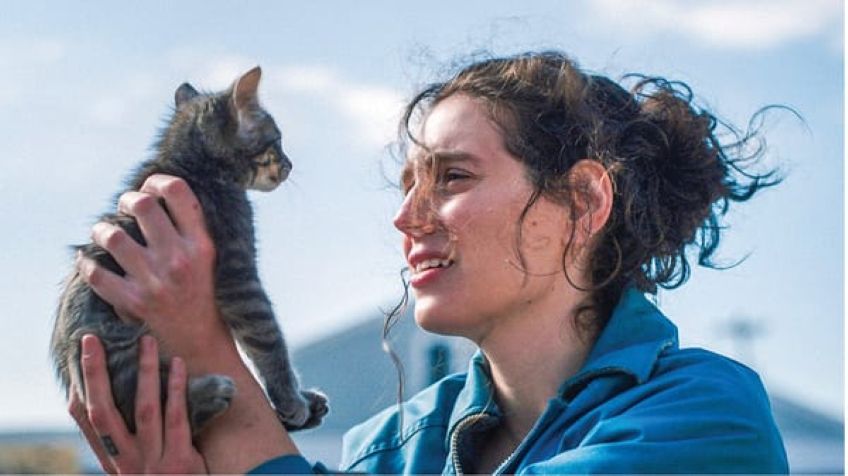Joyce Glasser reviews Sorry, Baby (August 22, 2025) Cert 15, 103 mins.
Here’s one movie that is not let down by its ending. The title of the film becomes clear as Agnes, a single grad student-turned- English professor in New England pushing 30, is left alone with her best friend’s baby and worries that she won’t know what to do or say. She rises to the occasion and finds the words that keep the baby quiet, sooth her soul and give a profound meaning to the title.
Eva Victor is not only the writer and director of Sorry, Baby, but plays Agnes a lanky and attractive, grad student on the verge of a professorship despite her young age. Agnes is a highly sensitive woman, self-conscious, self-reflective but she is no push-over and is quietly driven. In several scenes, including a meeting with vindictive classmate Natasha (Kelly MacCormick), we see her sense of fairness, acceptance and compassion.
The film is about a sexual assault, but the traumatic event is handled in a novel manner, as Victor is less interested in the crime than in the repercussions. She deftly plays with time to show the impact of a sexual assault on her character. We can always tell the before and after by physical traits, such as Agnes’s hair and demeanour, and even the way her remote house at the edge of a wood is shot.

When we first meet Agnes she is wild with joy at welcoming her best friend Lydie (Naomi Ackie) who moved to New York after graduation. Lydie’s visit is portrayed as one long slumber party in which we see how close the two women are. They snack, giggle, talk about men’s egos, and fall asleep together in the living room.
We also learn, in their conversations, that Agnes chose to stay at the school rather than explore opportunities elsewhere. She finds herself stuck with her nemesis, who is outwardly jealous of Natasha, a competitor for a professorship and, as we witness at a dinner party, maliciously so.
Close as Agnes and Lydie were, and perhaps still are, they were never more – or less than best friends. Lydie, a lesbian, has found her spouse and picks the right moment to break the news to a dumbstruck Agnes that she’s pregnant. ‘Are you going to call it Agnes?,’ Agnes asks, only partly because she is lost for words.
In the chapter, The Year with the Bad Things, Agnes and Lydie are students rooming together, Agnes excelling and chastising Lydie for being late with her paper. When Agnes gets a text from their professor, Preston Decker (Louis Cancelmi), Lydie knows who it is from as if by osmosis.
Agnes strenuously denies Lydie’s suspicion that they are having an affair. She is after his validation and he uses that to get more. When they meet in his office to discuss her thesis and he confesses he’s struggling with a new book, she tells him she loved his first book and encourages him. Then it’s Agnes’ turn to bask in the glow of his praise for her thesis. ‘Frankly, I couldn’t put it down,’ he tells her but has to end the conversation when his ex-wife calls to say their child is ill.

If the seduction takes place in Decker’s office, the assault takes place off camera. When Agnes returns to Decker’s office for her thesis, and he’s not there, she walks to his house. We hear her ask, ‘do you have my thesis?’ and the house lights come on.
We get a detailed description of what transpired when Agnes returns home and relates everything to Lydie. Much of what Agnes encounters in her attempts to seek justice with the authorities is, by now, a bit trite, but that does not diminish the rage women might feel. A male doctor comments that it’s a shame she took a bath after the attack as it would weaken the evidence. ‘I’ll remember that for next time,’ Agnes retorts, accompanied by the supportive Lydie.
The school authorities – represented by two women – cannot take up the case as Dr Decker resigned right after the incident and is no longer an employee.
The film explores the aftermath of the assault in other ways, including a weird relationship with a neighbour, Gavin (Lucas Hedges) in which Agnes displays a side of her personality takes us into ‘Frances Ha’ (quirky Greta Gerwig) territory and doesn’t fit. Perhaps the point is to show Agnes’s difficulty getting used to a “normal” relationship after her assault, but I didn’t believe she would act so crudely or treat a kind, clearly smitten young lover so condescendingly.
On the other hand, Victor nails it in another scene. When Agnes has a tête à tête with Natasha and learns that Natasha, eager to garner Decker’s favours, slept with him, she is so revolted that she goes out driving and stops in the middle of the road during a panic attack.
She is assisted by Pete (John Carroll Lynch) the owner of an empty sandwich shop by the side of the road. Pete is a non-judgmental sounding board and their conversation is, arguably, the highlight of the film. It also reveals Agnes obsessions with fear and age. When Pete asks Agnes if she has children she replies, ‘no, I don’t want to get old.’
As for the fear, that implodes in the final tear-inducing scene with the baby, a scene that is worth the price of admission.




